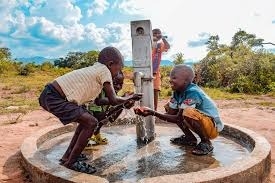In the vast expanse of Africa, where arid landscapes often dominate the scenery, the presence of water wells signifies more than just a source of hydration; it symbolizes life, hope, and resilience. These wells, scattered across the continent, serve as lifelines for communities, providing sustenance, opportunity, and a pathway towards a brighter future. Let's delve into the profound impact of water wells in Africa, exploring their significance, challenges, and the transformative power they hold.
The Essence of Life:
Water is the essence of life, an undeniable truth that resonates deeply in Africa's parched regions. Access to clean and reliable water is not just a convenience but a necessity for survival. In rural villages where infrastructure is scarce, and droughts are frequent, water wells stand as beacons of hope. They offer a consistent and accessible source of water, empowering communities to thrive amidst adversity.
Empowering Communities:
The presence of a water well transforms entire communities. It liberates women and children from the arduous task of trekking long distances to fetch water, freeing up valuable time for education, work, and community engagement. With readily available water, agricultural activities flourish, enabling families to cultivate crops and sustain livestock even in the harshest of environments. This newfound stability fosters economic growth and strengthens the social fabric of these communities.
Health and Hygiene:
Access to clean water is fundamental to maintaining good health and hygiene. Waterborne diseases, such as cholera and dysentery, pose significant threats in regions where clean water is scarce. Water wells equipped with filtration systems provide a reliable source of potable water, reducing the prevalence of water-related illnesses and improving overall well-being. Proper sanitation practices become attainable, further enhancing the quality of life for residents.
Challenges and Solutions:
Despite their undeniable benefits, water wells in Africa face a myriad of challenges. Limited access to technology and resources often hinders the construction and maintenance of wells, particularly in remote areas. Moreover, environmental factors such as droughts and groundwater depletion exacerbate the struggle for water security. Addressing these challenges requires a multifaceted approach, including investment in infrastructure, technological innovation, and community engagement.
Organizations and initiatives dedicated to water accessibility, such as charity: water and Water.org, play a crucial role in bridging the gap. Through partnerships with local communities and governments, these organizations implement sustainable solutions, ranging from well drilling to education on water conservation practices. By empowering communities to take ownership of their water resources, these initiatives create lasting impacts that extend far beyond the well site.
The Ripple Effect:
The impact of water wells extends far beyond the communities they serve. It creates a ripple effect, catalyzing positive change across entire regions. As communities flourish, neighboring villages are inspired to replicate their success, sparking a wave of development and progress. The ripple effect of water wells transcends geographical boundaries, uniting humanity in a shared quest for a better tomorrow.
Conclusion:
Starving African Boy are more than just structures; they are symbols of hope, resilience, and human ingenuity. They represent the triumph of the human spirit over adversity and the collective effort to build a more sustainable future. As we celebrate the significance of water wells, let us reaffirm our commitment to ensuring access to clean water for all. Together, we can turn the tide of water scarcity and create a world where every individual has the opportunity to thrive.


